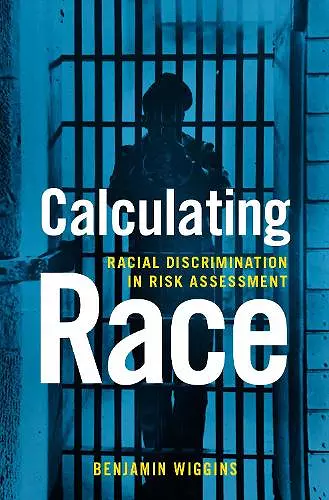Calculating Race
Racial Discrimination in Risk Assessment
Format:Hardback
Publisher:Oxford University Press Inc
Published:9th Dec '20
Currently unavailable, and unfortunately no date known when it will be back

In Calculating Race, Benjamin Wiggins analyzes the historical relationship between statistical risk assessment and race in the United States. He illustrates how, through a reliance on the variable of race, actuarial science transformed the nature of racism and helped usher racial disparities in wealth, incarceration, and housing from the nineteenth century into the twentieth. Wiggins begins by tracing how the life insurance industry utilized race in its calculations at the end of the nineteenth century, focusing particularly on Prudential and its aggressive battles with state regulators to discriminate against clients and adjust rates on the basis of race. He then turns his focus to the collection of racial statistics in the Illinois state penitentiary system in the late nineteenth century and the state's subsequent development of predictive sentencing and parole formulas in the 1920s that weighed race as a key factor. Next, he investigates the role of race in the state-sponsored mortgage insurance program of the Federal Housing Administration between the start of the New Deal and the beginning of the Cold War and its prolonged effects on mortgage lending. Wiggins concludes with an analysis of the use of race in the statistical risk assessments across financial institutions and government programs during the post-civil rights movement era, and how that practice has been transformed in the twenty-first century through "proxy" variables which stand in for the now taboo category of race. Offering readers a new perspective on the historical importance of actuarial science in structural racism, Calculating Race is a particularly timely contribution as Big Data and algorithmic decision making increasingly pervade our lives.
The book presents very detailed and logically coherent evidence to correct the oversight about the historical understanding of the relationship between risk assessment and race. * Alfred Nunoo Arthur, Journal of Economics, Race, and Policy *
A readable, succinct historical primer useful for anyone interested in understanding how debates over the relationship between risk and race have played out over the past century, including useful links to contemporary conversations over fairness in machine learning. * D Hirschman, Social Forces *
This book would be a useful addition to undergraduate seminars, particularly for the accessible way in which Wiggins contextualizes scholarly discussions while keeping a close eye on archives as sources of new understanding. * Technology and Culture *
Wiggins's research contributes a lot to ongoing investigations into how federal mortgages policies exacerbated racial inequalities ... Wiggins's archival digging indicates the very real possibility that the infamous federal redlining practices may have come out of the banking and life insurance industries. * Reviews in American History *
Calculating Race offers a thoughtful exploration of the way that algorithms shaped and controlled the lives of Americans in unequal ways long before our time ... Wiggins's important book should be read by any historian focused on racism and inequality in recent American history. * Brent M S Campney, Journal of American History *
This book adds an interesting and useful perspective for actuaries ... This book helps us to understand the historical relationship between statistical risk assessment and race in the life insurance and mortgage industries. * Chris Dolman, Edward (Jed) Frees and Fei Huang, Annals of Actuarial Science *
Calculating Race reveals that actuarial science has always been foundational to the concept of race and the preservation of racism in America. Wiggins brilliantly traces the history linking purportedly objective risk calculations with racial subordination—from insuring enslaved Africans as property to life insurance policy rates, criminological formulas, and federal mortgage risk assessments, presaging today's computerized predictive algorithms that build in racial bias. A powerful account of how constructing black people as a risk has long obscured the racism that puts them at risk and the need to distribute risk equitably instead. * Dorothy Roberts, Author of Fatal Invention: How Science, Politics, and Big Business Re-create Race in the 21st Century *
Benjamin Wiggins's Calculating Race reminds us of the long and uncomfortable history of algorithmic discrimination in insurance, criminology, and housing. Wiggins links past and present to offer new insights into how ostensibly objective mathematical tools may expand rather than reduce racial bias. This study will be of interest across the social sciences as well as to technical specialists grappling with the challenge of creating more fair and just computer based decision tools. * Jennifer S. Light, Director of the Program in Science, Technology, and Society, MIT *
Scholars sometimes treat forms of capital steeped in speculation, actuarial calculations, and algorithms as recent phenomena—as characteristic of what they call "late capitalism." Benjamin Wiggins instead persuasively demonstrates that these approaches have long been used across a range of social institutions and projects: from life insurance to real estate to incarceration. Calculating Race is a massive contribution to studies of capital, race, inequality, and the history of science, as well as a fascinating story backed by illuminating, original analysis and powerful theoretical insights. * Michael Ralph, Professor and Chair of Afro-American Studies, Howard University *
...this book would be a useful addition to undergraduate seminars... * Michael F. McGovern, Technology and Culture *
ISBN: 9780197504000
Dimensions: 236mm x 152mm x 13mm
Weight: 318g
160 pages